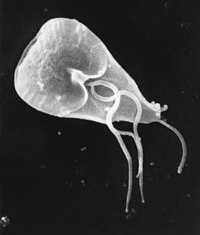
Photo from wikipedia
The proteoglycan serglycin (SG) is expressed by different innate and adaptive immune cells, e.g. mast cells, macrophages, neutrophils, and cytotoxic T lymphocytes, where SG contributes to correct granule storage and… Click to show full abstract
The proteoglycan serglycin (SG) is expressed by different innate and adaptive immune cells, e.g. mast cells, macrophages, neutrophils, and cytotoxic T lymphocytes, where SG contributes to correct granule storage and extracellular activity of inflammatory mediators. Here the serglycin-deficient (SG−/−) mouse strain was used to investigate the impact of SG on intestinal immune responses during infection with the non-invasive protozoan parasite Giardia intestinalis. Young (≈11 weeks old) oral gavage-infected congenic SG−/− mice showed reduced weight gain as compared with the infected SG+/+ littermate mice and the PBS-challenged SG−/− and SG+/+ littermate mice. The infection caused no major morphological changes in the small intestine. However, a SG-independent increased goblet cell and granulocyte cell count was observed, which did not correlate with an increased myeloperoxidase or neutrophil elastase activity. Furthermore, infected mice showed increased serum IL-6 levels, with significantly reduced serum IL-6 levels in infected SG-deficient mice and decreased intestinal expression levels of IL-6 in the infected SG-deficient mice. In infected mice the qPCR analysis of alarmins, chemokines, cytokines, and nitric oxide synthases (NOS), showed that the SG-deficiency caused reduced intestinal expression levels of TNF-α and CXCL2, and increased IFN-γ, CXCL1, and NOS1 levels as compared with SG-competent mice. This study shows that SG plays a regulatory role in intestinal immune responses, reflected by changes in chemokine and cytokine expression levels and a delayed weight gain in young SG−/− mice infected with G. intestinalis.
Journal Title: Frontiers in Immunology
Year Published: 2021
Link to full text (if available)
Share on Social Media: Sign Up to like & get
recommendations!